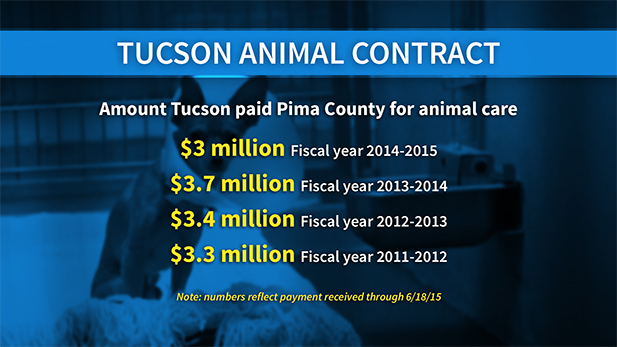Listen:
The city of Tucson will pay almost $5 million to Pima County for animal care this year.
The city contracts with the county, as do all of the other tows in the metro area, to take in stray pets and provide health care and adoption services through the Pima Animal Care Center.
Costs have gone up in recent years, which caused friction between some of the municipal governments, said Kim Janes, the chief of external affairs at PACC.
Reasons for the cost increase: - the county is providing more spay/neuter services at low cost or no cost to the community
“That is the one single most effective way we’ve found in Pima County to reduce the number of animals coming in,” he said. Initially, that plan causes cost increases, but the county is taking in 1,000 fewer animals each year because of those efforts, he said.
- the county moved from a policy of euthanizing animals that could not be medicated or healed, to one a model of treating more of the tough cases so they can be adopted. That means more care for abandoned and neglected animals, Janes said. “We start from a pretty rough spot for some of these pets, so it takes a little extra effort to rehabilitate them and rehome them.”
More animals meant a need for more space, and the county added a temporary tent to house stray animals awaiting reunification with their owner.
The long-term solution is a voter-approved expansion, which is set to begin construction within one year, Janes said.
“The bricks and mortar are pretty strong but the infrastructure, the kennels themselves, the layout of the facility just isn’t very good. So if we have to replace everything that’s out there now with brand new that’s what we’re going to do,” Janes said.
Municipal animal care contract negotiation "was a bit of a bitter pill to swallow for all of us," Janes said, but he added that he thinks it was worth it to stop the euthanizasia. The cities and towns are responsible for their own animal care, and they choose to contract with county instead of operating their own, he said.
When can PACC determine whether those efforts are successful?
"We’re already seeing success,” janes said. “The number of animals taken in each year are going down significantly. That is the first indicator. The second indicator is that we’re able to rehabilitate and rehome almost 85 percent of the pets coming into the shelther now.”
The industry-wide goal is to save 90 percent of animals taken to shelters. Janes said he thinks PACC can surpass that number.
Study seeks answer to whether dogs help owners' health Literature suggests that dogs are really good for children in reducing allergies and immune disorders, so University of Arizona researcher Kim Kelly decided to see whether the same is true for older animal owners.
Her study will measure whether dogs have a probiotic effect on the physical health of their owners.
It begins with volunteers who do not own dogs, and are not on antibiotics, Kelly said. They are matched with a dog from the Humane Society. The person and the dog get baseline tests of stool, skin and saliva. Those samples are taken again at least once a month in the four-month study.
“We’re looking at the emotional and psychological effect," she said, including the immunity in the human and changes in the the microbiota in the dog and the person after they live together.
Participants are in the study for three to four months, and the Humane Society is hoping the study pairs become a permanent match, that the owners keep the dogs they live with during the study.
Researchers are collecting data through September, analyzing the data through December. This is a pilot study that could prompt a larger study, Kelly said.
Participants can have cats, but data shows they may have an adverse affect on human health.


By submitting your comments, you hereby give AZPM the right to post your comments and potentially use them in any other form of media operated by this institution.